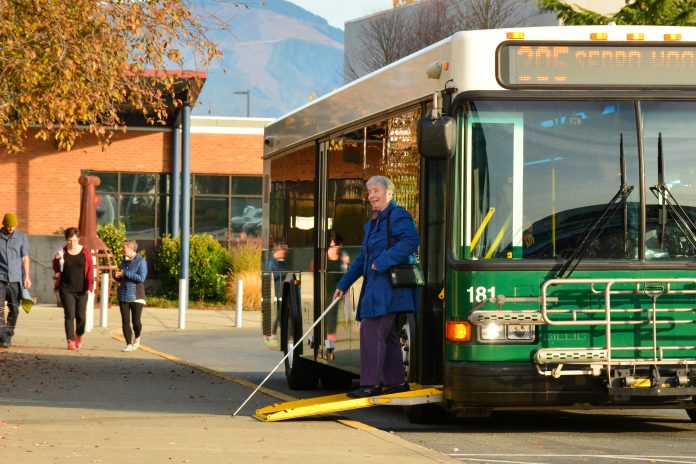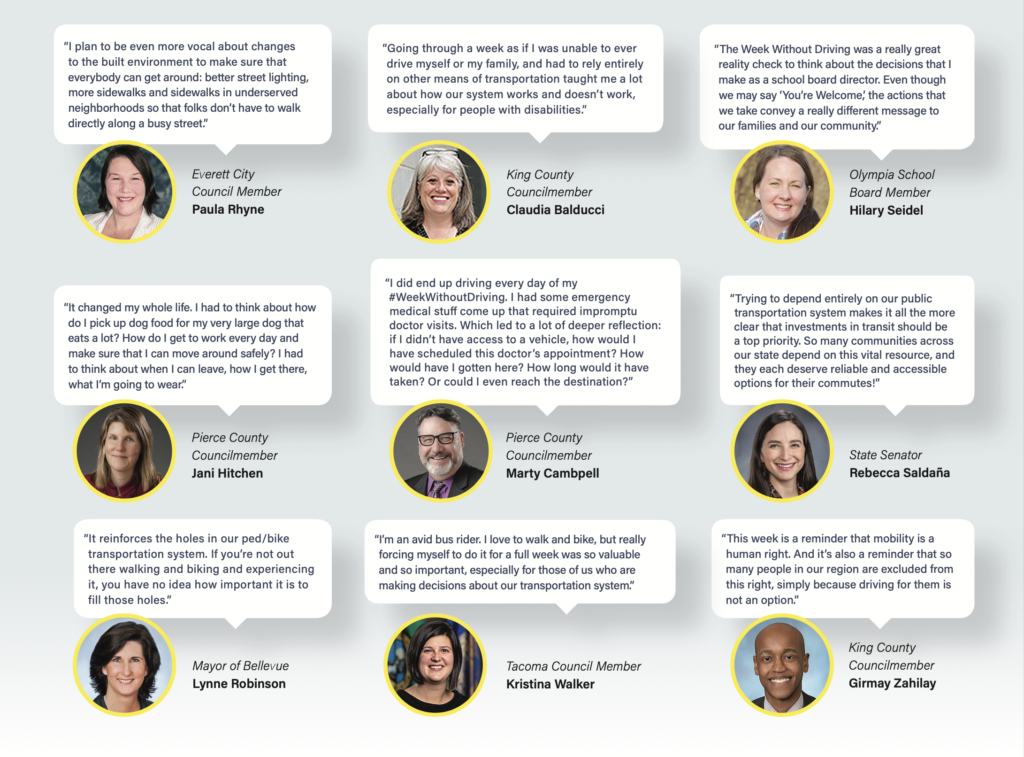
Take the challenge and go carless from October 2 to 8.
For the last two years, Disability Rights Washington has invited elected leaders and policymakers across Washington State to participate in the Week Without Driving challenge. This year, advocates are taking the challenge nationwide.
Nationally, more that 123 groups from 35 states and Washington D.C. are hosting the challenge in their communities, organizers report. For example, Access Living Chicago, Disability Rights New York, Dallas Bicycle Coalition, Sustain Charlotte, Our Streets Minneapolis and the Living Streets Alliance from Tucson have all invited local leaders to join. From Milan, Michigan to Tucson, Arizona, Denver to Eureka, Oregon, we’ve already heard reports about its impact.
The goal is to show everyone what it’s like to be a nondriver in a system meticulously designed for drivers. While non-drivers are often overlooked and nearly invisible in some communities, they are a sizable minority and one that needs to get around like everyone else.
Anna Zivarts spearheaded the challenge, which The Urbanist signed on to last year and again this year. She runs the Disability Mobility Initiative at Disability Rights Washington.
“Nearly a third of the US population does not have a driver’s license,” Zivarts wrote in a Bloomberg op-ed. “This cohort of non-driving Americans isn’t just children below driving age: It encompasses a growing share of young adults, older people who have aged out of their driving years, and people with disabilities — including low-vision people like me. Many others do not have access to a car, a group that is much more likely to include Black and Native American people, immigrants and those in poverty.”
Zivarts sent a press release explaining the instructions for participants: “The #WeekWithoutDriving challenges elected leaders, advocates, and individuals to understand the barriers for non-drivers. Participants can get around however they want, but can’t drive themselves. This applies to all activities — not just work commutes. The challenge isn’t about not using a car, rather it’s to see what it’s like to not be the one able to drive, to better understand what it’s like to try to navigate their communities without the privilege of driving.”
This awareness raising could have big impacts on transportation policy.
“If we’re making it safe for our elders, for our young people, for people with disabilities to navigate their community, then we’re making it safe for everyone,” said Seattle City Councilmember Tammy Morales, who participated last year.

Another past participant was Claudia Balducci who is a King County Councilmember and chair of Sound Transit Board’s system expansion committee. “There’s just no substitute for getting out there and experiencing your transportation system for yourself,” Balducci said. “It was very eye-opening how our system doesn’t work for all trips that people need to make, especially when you live where I do, in the suburbs.”
The Urbanist couldn’t agree more and has urged the rest of the Sound Transit Board to ride transit regularly so they can be better informed transportation policymakers.
Other Washington State elected leaders who plan to participate this year include:
- Kitsap County Commissioner Christine Rolfes
- City of Mountlake Terrace Councilmember Erin Murray
- Clark County Councilmember Glen Yung
- Redmond City Planning Commissioner Angie Nuevacamina
- City of Mountlake Terrace Councilmember Jeff Rivers
- City of Everett Mayor Cassie Franklin (also a Sound Transit Boardmember)
- Bainbridge Island City Councilmember Leslie Schneider
- Snohomish City Councilmember Megan Dunn
- Everett City Councilmember Paula Rhyne
- Pierce County Councilmember Ryan Mello
- City of Stanwood Councilmember Tansy Schroeder
- Walla Walla Councilmember Tom Scribner
- State Senator Jamie Pedersen
- Franklin County Councilmember Rocky Mullen
- City of Pasco Councilmember Joseph Campos
- City of West Richland Councilmember Richard Bloom
- City of Prosser Councilmember Steve Becken
- State Representative Joe Fitzgibbon
- State Senator Rebecca Saldaña
- King County Councilmember Girmay Zahilay
- State Senator Marko Liias
- State Senator Emily Randall
- City of Tacoma Deputy Mayor Kristina Walker (also a Sound Transit Boardmember)
- State Representative Emily Alvarado
Elected officials, let’s add to the list. Sign up on the Week Without Driving website.
Plus, most local transit agencies have partnered this year, as have a plethora of advocacy organizations including ForeverGreen Trails, Climate Solutions, Cascadia Consulting, Sierra Club, Move Redmond, Transit Riders Union, Empower Movement, Transit Trekker, Transportation Choice Coalition, Seattle YIMBY, Arc of Snohomish County, Arc of Washington, Commute Seattle, Feet First, Kirkland Greenways, Seattle Neighborhood Greenways, SnoTrac, Sightline Institute, 350 WA, All Aboard WA/Northwest, Downtown on the Go, Cascade Bicycle Club/WA Bikes, Leafline Trails Coalition, People First of Washington, WSP, and yours truly, The Urbanist.
Zivarts said Washington State Department of Transportation (Secretary Roger Millar), the Seattle Department of Transportation (Director Greg Spotts), Sound Transit (CEO Julie Timm) are all onboard.
Some participating urbanists who are already car-free might feel like this is not a very special week. But it is!
Car-free folks’ role is to remind others that this can be done. It’s not impossible; it’s just often inconvenient and humbling. Waiting 30 minutes for a late Route 8 bus or dodging errant left-turning motorists crossing the street is no fun. But walking, rolling, biking, or riding transit to get around has its moments of joy too, like the peace of a quiet street or the friendly interactions people tend to have when they not ensconced in a two-ton metal boxes.
The Urbanist invites everyone, especially policymakers, to take the pledge so that you can experience (for at least for a week) the transportation system without the comfort and hegemonic powers of an automobile — like many of us do year-round. Participants might learn a great deal about how to share the road and invest in a brighter future that works better for all of us.
The Urbanist editorial board consists of Linda Hanlon, Ryan Packer, and Doug Trumm.
Update: This article was updated on September 25 to note additional pledge participants.
The Urbanist was founded in 2014 to examine and influence urban policies. We believe cities provide unique opportunities for addressing many of the most challenging social, environmental, and economic problems. We serve as a resource for promoting and disseminating ideas, creating community, increasing political participation, and improving the places we live.

